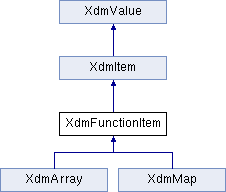#include <XdmFunctionItem.h>
The class XdmFunctionItem represents a function item
◆ XdmFunctionItem() [1/3]
| XdmFunctionItem::XdmFunctionItem |
( |
| ) |
|
◆ XdmFunctionItem() [2/3]
| XdmFunctionItem::XdmFunctionItem |
( |
jobject |
obj | ) |
|
XdmFunctionItem constructor created from a Java object - internal use.
XdmFunctionItem constructor created from a JNI Java object. This is for internal use only
- Parameters
-
◆ XdmFunctionItem() [3/3]
◆ ~XdmFunctionItem()
| virtual XdmFunctionItem::~XdmFunctionItem |
( |
| ) |
|
|
inlinevirtual |
◆ call()
Call the function.
- Parameters
-
| processor | - the SaxonProcessor object required in the call of the function |
| arguments | - the values to be supplied as arguments to the function. The "function
conversion rules" will be applied to convert the arguments to the required type when necessary. |
| argument_length | - the length of the array |
- Returns
- the result of calling the function
◆ createXdmValueArray()
| XdmValue** XdmFunctionItem::createXdmValueArray |
( |
int |
len | ) |
|
|
inline |
Utility method for working with SaxonC on Python
◆ getArity()
| int XdmFunctionItem::getArity |
( |
| ) |
|
|
virtual |
Get the arity of the function.
- Returns
- the arity of the function, that is, the number of arguments in the function's signature
Reimplemented in XdmArray.
◆ getName()
| const char * XdmFunctionItem::getName |
( |
| ) |
|
Get the name of the function as EQName.
The expanded name, as a string using the notation devised by EQName. If the name is in a namespace, the resulting string takes the form Q{uri}local. Otherwise, the value is the local part of the name.
- Returns
- the function name as a string in the EQName notation, or null for an anonymous inline function item
◆ getSystemFunction()
Get a system function.
This can be any function defined in XPath 3.1 functions and operators, including functions in the math, map, and array namespaces. It can also be a Saxon extension function, provided a licensed Processor is used.
- Parameters
-
| processor | - The Saxon Processor object required to get the system function |
| name | - the name of the function |
| arity | - the number of arguments in the function |
- Returns
- the requested function, or null if there is no such function. Note that some functions (those with particular context dependencies) may be unsuitable for dynamic calling.
◆ getType()
| XDM_TYPE XdmFunctionItem::getType |
( |
| ) |
|
|
inlinevirtual |
Get the type of the object
Reimplemented from XdmItem.
Reimplemented in XdmMap.
◆ isAtomic()
| bool XdmFunctionItem::isAtomic |
( |
| ) |
|
|
inlinevirtual |
Check if this XdmItem is atomic
- Returns
- false
Reimplemented from XdmItem.
◆ isFunction()
| bool XdmFunctionItem::isFunction |
( |
| ) |
|
|
inlinevirtual |
Determine whether the item is a function or some other type of item.
- Returns
- true if the item is a Xdm function item, false if it is an atomic value or a function (including maps and arrays)
Reimplemented from XdmItem.
Reimplemented in XdmMap.
◆ fname
| std::string XdmFunctionItem::fname |
|
protected |
The name of the function item
The documentation for this class was generated from the following files:



 Public Member Functions inherited from XdmItem
Public Member Functions inherited from XdmItem Public Member Functions inherited from XdmValue
Public Member Functions inherited from XdmValue Protected Attributes inherited from XdmItem
Protected Attributes inherited from XdmItem Protected Attributes inherited from XdmValue
Protected Attributes inherited from XdmValue Protected Member Functions inherited from XdmValue
Protected Member Functions inherited from XdmValue